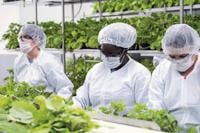Some social media accounts are claiming a new law in the United Kingdom will allow the production of food products that have been genetically modified to include medicine and vaccines. This is false. The Genetic Technology (Precision Breeding) Act 2023 that was passed last month in the House of Commons will permit farmers to develop genetically edited crops to improve production.
Some and users claimed the U.K. is allowing the production of food that has been genetically modified to include medicine and vaccines in it. They claimed this move will allow the government to give people medicine and vaccines without their informed consent.
The users attached a video with their posts about Medicago, a former Quebec-based vaccine maker. The one-minute 10-second video starts with before switching to what appears to be a explaining how plants were being used to produce vaccines. The full promotional video is no longer available online and could not be found from other sources.
"Last week the U.K. allowed genetically medicines food into your food chain. Even though the public has consistently rejected it. Vaccinated food will remove your informed consent. But then the public’s consent no longer matters,"
Rating: False
The Parliament in the United Kingdom passed new legislation called the Genetic Technology (Precision Breeding) Act 2023 on March 23. The law will allow farmers to produce gene-edited food.
The says the law will allow farmers to use precision-breeding techniques to grow crops that are drought and disease resistant and reduce use of fertilizers and pesticides.
"Precision breeding involves using technologies such as gene editing to adapt the genetic code of organisms – creating beneficial traits in plants that through traditional breedingwould take decades to achieve," the government says.
"This enables scientists to safely create foods that are more flexible, adaptable and plentiful for years to come."
The new law will also allow farmers to breed animals to make them more resistant to catching harmful diseases in the future.
"While there is great potential for increasing innovation, the government recognizes that there is a need to safeguard animal welfare in the new regulatory framework," the government says.
"That is why we are taking a step-by-step approach, enabling use of precision breeding technologies with plants first followed by animals later."
Plant-based vaccine
A plant-based vaccine was planned to be produced in Canada, but it is not related to the new U.K. law in any way.
Medicago, a Quebec-based drug manufacturer that produced a plant-based COVID-19 vaccine and other drugs, was shut down earlier this year.
Parent company Mitsubishi Chemical Group said on Feb. 3 it will shut down Medicago Inc., which was headquartered in Quebec City, citing changes to the COVID-19 vaccine market, global demand for COVID-19 vaccines and challenges facing Medicago in transitioning to commercial-scale production.
"The Group judged that it was not viable to continue to make further investment in the commercialization of Medicago’s development products, and decided to cease all of its operations at Medicago and proceed with an orderly wind up of its business and operations,"
Before its shutdown, Medicago used plant-based virus-like particle technology in developing a . The vaccine was administered as an injection and not through consumption of the plant.
Medicago Covifenz COVID-19 vaccine for use on adults in Canada in February 2022.
"After a thorough and independent scientific review of the evidence, the Department has determined that the vaccine meets Health Canada's stringent safety, efficacy and quality requirements, and that the benefits of this vaccine outweigh the potential risks," Health Canada said.
"In clinical trials, the vaccine was found to be 71 per cent effective against symptomatic infection and 100 per cent effective against severe disease caused by COVID-19."
Sources
Claims can be found on Twitter (, ), () and on Facebook ()
()
()
()
()
()
()
About ��ɫtv Press fact checks
You can find out more about ��ɫtvhere. To reach our fact-checking team with any tips, corrections or comments, please email us at cpfactcheck@thecanadianpress.com.




































